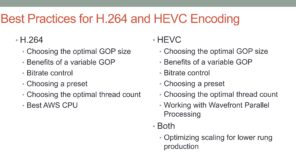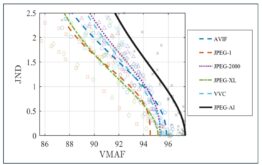I’m running some 1-pass vs. 2-pass comparison testing with x265. Unlike with x264 (see tests here), there’s a substantial performance penalty for running 2-pass with minimal quality benefit.
I tried the no-slow-firstpass=1 setting, which only accelerated two-pass by about 14%. Here are the results from a single test file. I don’t want to process them all if there’s a magic switch that accelerates two-pass x265.
As you can see in the table above, turbo mode reduced encoding time from 4:52 to 4:12, with just a slight decrease in quality. Single-pass encoding was about 45% faster than the two-pass turbo, and at least for this file, produced slightly higher quality; a man bites dog results.
The command strings were pretty generic.
Contents
One Pass
ffmpeg -y -i football.mp4 -c:v libx265 -preset medium -threads 8 -b:v 3500k -maxrate 7000k -bufsize 7000k -g 60 -x265-params open-gop=0 football_1pass.mp4
Two Pass – Baseline
ffmpeg -y -i football.mp4 -c:v libx265 -preset medium -threads 8 -b:v 3500k -maxrate 7000k -bufsize 7000k -g 60 -x265-params open-gop=0:pass=1:no-slow-firstpass=1 -f mp4 NUL
ffmpeg -y -i football.mp4 -c:v libx265 -preset medium -threads 8 -b:v 3500k -maxrate 7000k -bufsize 7000k -g 60 -x265-params open-gop=0:pass=2 -an football_2pass.mp4
Two Pass – Turbo
ffmpeg -y -i "football.mp4" -c:v libx265 -preset medium -threads 8 -b:v 3500k -maxrate 7000k -bufsize 7000k -g 60 -x265-params open-gop=0:pass=1:no-slow-firstpass=1 -f mp4 NUL
ffmpeg -y -i "football.mp4" -c:v libx265 -preset medium -threads 8 -b:v 3500k -maxrate 7000k -bufsize 7000k -g 60 -x265-params open-gop=0:pass=2 -an football_2pass_turbo.mp4
If anyone knows a better alternative for accelerating the first pass of x265, please LMK at janozer@gmail.com.
Thanks!
 Streaming Learning Center Where Streaming Professionals Learn to Excel
Streaming Learning Center Where Streaming Professionals Learn to Excel









